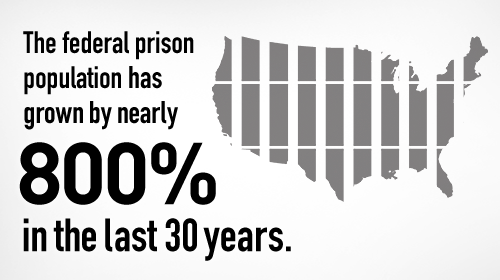
The following op-ed was originally published by The Hill.
If you doubt the unfairness of our country’s criminal justice system, look no further than Hamedah Hasan.
When Hamedah was 21 years old, she fled an abusive relationship and moved in with her cousin, who was a drug dealer. Feeling out of options and indebted to her cousin for helping her, she agreed to run various errands and transfer some money for him. Eventually she found the strength to move back home, hoping to get away from the drug operation and earn an honest living for the sake of her two small children.
But her past caught up with her, and Hamedah was convicted of conspiracy to distribute crack cocaine. Despite her previously clean record, her sentencing judge found his hands tied by mandatory minimum sentencing laws and initially sentenced her to a life sentence for a first-time, nonviolent drug crime.
Fortunately, after 19 years in prison, Hamedah was released last year as a result of the U.S. Sentencing Commission’s retroactive application of the new crack cocaine sentencing guidelines. But Hamedah’s story is sadly neither unusual nor unique.
It’s time to change our country’s extreme sentencing laws that destroy lives like Hamedah’s and waste taxpayer dollars with no benefit to public safety. We need the Smarter Sentencing Act to make our criminal justice system smarter, fairer, and more humane.
Introduced by Sens. Richard Durbin (D-Ill.) and Mike Lee (R-Utah) earlier this year, the bipartisan Smarter Sentencing Act reduces five, 10, and 20 year mandatory minimum sentences to two, five, and 10 years respectively for certain drug offenses. It also gives judges more leeway when sentencing people who do not pose a public safety risk.
The Senate Judiciary Committee is slated to consider the bill as soon as this Thursday along with other bills that would apply to cases like Hamedah’s. If it moves out of committee, the Smarter Sentencing Act will become the most significant piece of criminal justice reform to make it to the Senate floor in several years.
Extreme, one-size-fits-all sentencing has caused our federal prison population to balloon out of control, and it’s the top reason why our country has earned the dubious title of the world’s biggest jailer. Several recent reports have confirmed that mandatory minimum sentences like those that would be shortened by the Smarter Sentencing Act are a major contributor to the growing federal prison population.
This bill also addresses the serious budgetary problems that currently plague the federal prison system. The federal government cannot maintain a federal prison system that has grown at an astonishing rate of almost 800 percent over the last 30 years. In 2010, it cost us $80 billion dollars to incarcerate 2.3 million people in this country, and federal courts are overwhelmed with staggering immigration and criminal caseloads.
Fortunately momentum and popular opinion is on our side. Recent surveys have found that a majority of adults favor elimination of mandatory sentencing laws and support allowing judges to choose the appropriate sentence. The policies in the Smarter Sentencing Act have been unanimously supported by the bipartisan U.S. Sentencing Commission and by more than 50 former federal judges and prosecutors.
Even our nation’s top law enforcement official supports the Smarter Sentencing Act. In a speech earlier this year, Attorney General Eric Holder said, “widespread incarceration at the federal, state, and local levels is both ineffective and unsustainable… Legislation [like the Smarter Sentencing Act] will ultimately save our country billions of dollars.”
In recent years, we have finally gotten closer to finding the right balance between the concepts of consistency and fairness in sentencing. From the passage of the Fair Sentencing Act in 2010 to positive reforms from the U.S. Sentencing Commission, it’s clear that fair sentencing is smart policy. There’s no reason why the Senate Judiciary Committee should prevent the Smarter Sentencing Act from going to the floor for a full vote.
While the attorney general has taken some preliminary steps to address the mass incarceration crisis in this country, and the states have been introducing smart reforms to slow prison growth for years, the ball is now in Congress’ court. The Smarter Sentencing Act is a much needed next step toward a fairer criminal justice system.
Learn more about criminal law reform and other civil liberty issues: Sign up for breaking news alerts, follow us on Twitter, and like us on Facebook.


